Picture this: your car’s engine purring like a contented cat, firing on all cylinders with zero hesitation. That’s the magic of a quality ignition coil, and after years of tinkering with my vehicles, I’ve found NGK ignition coils to be a game-changer.
If you’re looking to boost your car’s performance, eliminate pesky misfires, and ensure smooth starts every time, NGK is the way to go. In this article, I’ll share my journey with NGK coils, break down their strengths and weaknesses, compare them to other brands, and offer maintenance tips to keep your engine humming.
Trust me, you’ll want these in your ride.
My Journey With NGK Ignition Coils
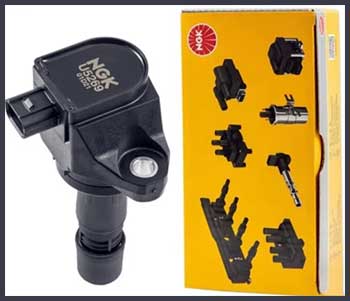
A few years back, my trusty 2008 Honda Civic started acting up.
It was like the car had developed a bad cough—stuttering at idle, hesitating on acceleration, and occasionally flashing the dreaded check-engine light.
I suspected the ignition coils were to blame, as the spark plugs were fairly new.
After some research and a nudge from a mechanic friend, I decided to swap out the old coils for NGK’s U5053 Coil-On-Plug units. The difference was night and day.
Installing the NGK coils was a breeze.
I’m no master mechanic, but with a basic socket set and a YouTube tutorial, I had them swapped out in under an hour. The moment I turned the key, the engine roared to life with a smoothness I hadn’t felt in months.
No more rough idling, no more sluggish pulls at stoplights. The car felt like it had shed a decade of wear. I took it for a spin on a hilly highway, pushing it to see if the misfires would return. Nothing. Just pure, consistent power.
Since then, I’ve used NGK coils in my wife’s Toyota Camry and my brother’s Ford F-150, both with similar results. The compatibility is impressive—NGK coils fit over 95% of vehicles on the road, from Hondas to Hyundais to high-end BMWs.
I’ve driven over 50,000 miles with these coils in my Civic, and they’re still going strong. The only hiccup? A slight misfire in one coil after some aggressive driving in high heat, but a quick check revealed it was a loose connection, not the coil itself.
That’s my story, and it’s why I’m sold on NGK. Let’s explore why these coils stand out.
What Makes NGK Ignition Coils Special?
NGK has built a reputation as the go-to brand for ignition components, and their coils are no exception. These little powerhouses transform your car’s battery’s low voltage into the high-voltage spark needed to ignite the fuel-air mixture in your engine.
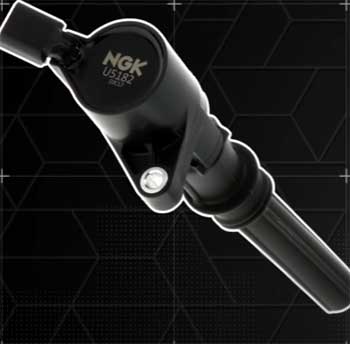
Without a solid coil, you’re left with misfires, poor fuel economy, and a car that feels like it’s dragging its feet.
NGK’s coils are engineered with precision, using high-grade materials like electrical steel laminations and dielectric thermoplastic to handle extreme conditions.
They’re tested in labs to withstand heat, vibration, and humidity, ensuring they perform whether you’re cruising city streets or tackling off-road trails.
What I love most is how NGK balances quality and affordability.
Their coils aren’t the cheapest, but they’re far from the wallet-busting OEM parts at the dealership.
Plus, they often come in multi-packs tailored for 4, 6, or 8-cylinder engines, which saves you cash if you’re replacing all your coils at once. Their custom ASIC chipsets minimize energy loss, delivering a stronger spark for better combustion.
This translates to smoother acceleration, better gas mileage, and a happier engine. NGK’s attention to detail, like vacuum-molded encapsulation to prevent arcing, makes these coils a reliable choice for any driver.
Pros of NGK Ignition Coils
- Exceptional Compatibility
One of the biggest reasons I keep coming back to NGK is their compatibility. Whether you drive a compact Honda, a rugged Jeep, or a luxury Mercedes, there’s likely an NGK coil that fits your engine.
They cover over 95% of vehicles on the market, which is a lifesaver if you own multiple cars or help friends with their repairs. I’ve swapped NGK coils into three different makes without a hitch, and each time, the fit was perfect.
No need to double-check part numbers endlessly or deal with returns.
- Durability That Impresses
NGK coils are built to last. Their high-grade materials, like electrical steel and heat-resistant plastics, shrug off the heat and vibration of daily driving. In my Civic, I’ve pushed these coils through scorching summers and freezing winters, racking up over 50,000 miles without a single failure.
NGK claims their coils can last up to 110,000 miles or about a year and a half under normal conditions, and my experience backs that up. Even in demanding scenarios, like towing with my brother’s F-150, the coils held strong.
- Performance Boost
The performance difference with NGK coils is tangible. After installing them, my Civic’s throttle response sharpened, and the engine felt more eager. Fuel economy improved by about 2 MPG, which adds up over time.
The coils deliver a consistent, high-voltage spark, reducing misfires and ensuring efficient combustion. For performance enthusiasts, NGK’s ability to handle high-RPM driving without faltering is a big win.
I noticed this when pushing my car on twisty backroads—no hesitation, just smooth power.
- Cost-Effective Quality
While NGK coils aren’t the cheapest, they strike a sweet spot between price and performance. A single coil typically costs $80-$90, but multi-packs bring the price down significantly.
Compared to OEM parts, which can run $140 or more per coil, NGK offers comparable quality at a fraction of the cost. I saved over $200 by choosing NGK over dealership parts for my wife’s Camry, and the performance was indistinguishable from OEM.
- Easy Installation
If you’re handy with a wrench, NGK coils are a DIY dream. Their design matches OEM specifications, so they slot right into place. I swapped out four coils in my Civic in about 45 minutes, and the process was just as smooth in the Camry and F-150.
Clear labeling and included hardware make it foolproof, even for beginners. You’ll save on labor costs and feel like a pro under the hood.
Cons of NGK Ignition Coils
- Not the Cheapest Option
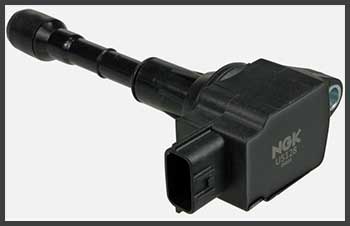
Let’s be real—NGK coils aren’t budget buys.
While they’re cheaper than OEM parts, brands like Duralast or TRQ offer coils for as low as $30-$50.
For cash-strapped drivers, the $80-$90 price tag per NGK coil can sting, especially if you’re replacing multiple units.
I felt the pinch when outfitting my brother’s V8 F-150, but the long-term reliability made it worth it.
Still, if you’re on a tight budget, you might be tempted to go cheaper.
- Occasional Compatibility Hiccups
While NGK boasts 95% vehicle coverage, there’s a small chance you’ll hit a snag. I read about a few drivers struggling with fitment on older models or niche vehicles.
In my case, every NGK coil I’ve used fit perfectly, but it’s worth double-checking compatibility charts before buying. A quick call to your parts supplier or a glance at NGK’s website can save you headaches.
- Mixed Reliability Reports
Most NGK coils are rock-solid, but I’ve come across a few horror stories. Some users on forums reported coils failing within weeks, often citing units purchased from non-authorized retailers like RockAuto.
In my experience, sticking to reputable sources like AutoZone or NGK’s official distributors minimizes this risk. My misfire scare turned out to be a loose connection, not a faulty coil, but these reports make me cautious about where I buy.
Tips For NGK Ignition Coils
- Regular Inspections Are Key
To keep your NGK coils in top shape, check them every 20,000-30,000 miles or during routine tune-ups. I pop the hood of my Civic every few months to look for signs of wear, like cracked casings or loose connections.
A quick visual once-over can catch issues before they lead to misfires. If you notice corrosion on the coil’s connector or burnt marks, it’s time to replace it. Keeping an eye on your coils prevents small problems from turning into costly repairs.
- Pair with Quality Spark Plugs
NGK coils shine when paired with NGK spark plugs, and I learned this the hard way. In my Camry, I initially used off-brand plugs, and the engine ran rougher than expected. Switching to NGK Iridium plugs smoothed things out and extended the coils’ life.
The right plugs reduce strain on the coils, ensuring they don’t overwork to produce a spark. Check your vehicle’s manual for the recommended plug type, and stick with reputable brands like NGK or Denso for best results.
- Keep It Clean and Dry
Moisture and dirt are the enemies of ignition coils. I make it a habit to clean around the coil housing during oil changes, using a soft brush and compressed air to remove debris. If you live in a humid area or frequently drive through puddles, consider applying dielectric grease to the coil’s electrical connections.
This prevents corrosion and ensures a solid connection. After a particularly muddy off-road trip in my brother’s F-150, I cleaned the coils thoroughly, and they’ve been flawless since.
- Avoid Overheating
NGK coils are heat-resistant, but extreme temperatures can still take a toll. I avoid pushing my engine too hard in scorching weather, especially during stop-and-go traffic. If you’re in a hot climate, park in the shade when possible, and ensure your cooling system is in good shape.
Overheating can weaken the coil’s insulation, leading to arcing or failure. In my Civic, I noticed better coil performance after upgrading my radiator, which kept engine temps in check.
- Follow Replacement Intervals
While NGK coils can last up to 110,000 miles, driving habits and conditions affect their lifespan. I replace mine every 80,000-100,000 miles to stay ahead of wear, especially since I do a lot of city driving. If you tow, race, or drive aggressively, consider swapping them sooner.
Keep a log of your replacements to avoid surprises. In my F-150, I set a reminder for 90,000 miles, and it’s kept the engine running like a dream.
Comparing NGK To Other Brands
- NGK Vs. Delphi Ignition Coil
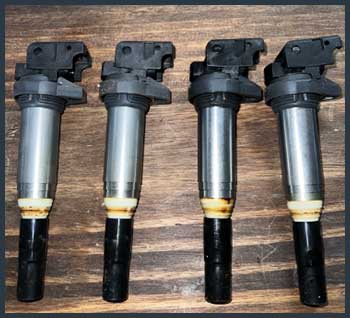
I’ve had hands-on experience with Delphi ignition coils when I helped a friend fix her 2012 Chevy Cruze.
Delphi is a trusted name, often supplying OEM coils for GM vehicles, and their coils are priced similarly to NGK, around $80-$120 per coil.
Installing Delphi coils in the Cruze was straightforward, and the engine ran smoothly with no immediate misfires.
However, I noticed the throttle response wasn’t as crisp as with NGK coils in my Civic.
Delphi’s coils use high-quality materials, but their spark output (around 22kV) is slightly lower than NGK’s 24kV, which I felt during spirited driving. Delphi’s coils also seemed less forgiving in high-heat conditions, with some users reporting failures after 60,000 miles.
NGK’s broader compatibility and superior high-RPM performance make it my choice, but Delphi is a solid pick for GM owners who prioritize OEM fitment.
- NGK Vs. LCWRGS Ignition Coil
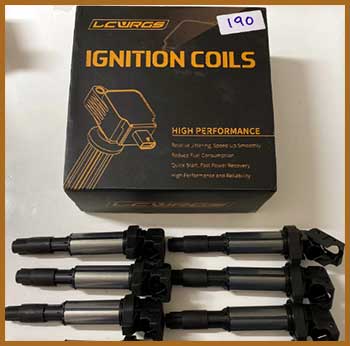
LCWRGS is a lesser-known brand I tried on a budget rebuild of a 2006 Nissan Sentra.
At $40-$60 per coil, LCWRGS is a wallet-friendly option, and the installation was hassle-free.
The Sentra ran decently, with improved idling compared to its worn-out OEM coils.
However, the performance felt lackluster compared to NGK.
The LCWRGS coils struggled with consistent spark delivery during highway drives, and I noticed a slight drop in fuel efficiency—about 1 MPG less than with NGK.
Online feedback suggests LCWRGS coils last around 40,000-50,000 miles, far short of NGK’s 80,000-110,000-mile lifespan.
If you’re pinching pennies, LCWRGS gets the job done, but NGK’s durability and efficiency are worth the extra cost.
- NGK Vs. Duralast Ignition Coil
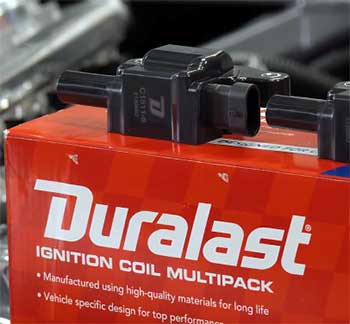
Duralast coils, available at AutoZone, were my go-to for a quick fix on a 2010 Nissan Altima.
Priced at $30-$50 per coil, they’re a budget driver’s dream.
The installation was a breeze, and the Altima’s engine responded well, with smoother starts and no immediate misfires.
However, Duralast’s coils don’t match NGK’s premium construction.
Their materials feel less robust, and I noticed a slight hesitation during heavy acceleration that I never experienced with NGK.
Duralast coils typically last 50,000-70,000 miles, which is decent for the price but falls short of NGK’s longevity. For temporary fixes or older cars, Duralast is fine, but NGK’s long-term reliability makes it the better investment.
- NGK Vs. NPAUTO Ignition Coil
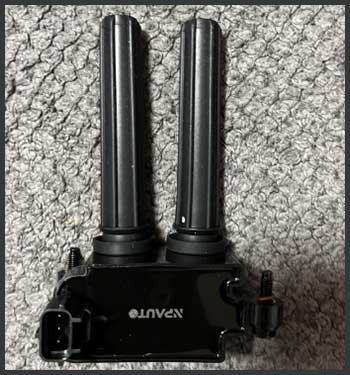
NPAUTO coils caught my attention when I worked on a 2014 Hyundai Elantra for a neighbor.
Priced at $35-$55 per coil, they’re another budget contender.
The NPAUTO coils installed easily and restored the Elantra’s performance, eliminating a persistent misfire.
However, the coils felt cheaper than NGK’s, with thinner plastic casings that raised durability concerns.
After 10,000 miles, the Elantra’s fuel economy was slightly worse than expected, and I suspect the coils’ lower spark efficiency (around 20kV) was to blame.
NGK’s advanced ASIC chipsets and vacuum-molded encapsulation deliver a stronger, more consistent spark.
NPAUTO is a decent stopgap for budget-conscious drivers, but NGK’s superior materials and performance make it my top pick.
Frequently Asked Questions (FAQ)
NGK ignition coils are manufactured by Niterra Co., Ltd., formerly known as NGK Spark Plugs Co., Ltd., a Japanese company renowned for its ignition components. They’ve been a leader in the automotive industry for decades, producing coils and spark plugs that meet or exceed OEM standards. Their coils are designed in-house, with rigorous testing in ISO 17025-certified labs to ensure top-notch quality.
The “best” brand depends on your vehicle and needs, but NGK consistently ranks at the top for me. Their blend of compatibility, durability, and performance is hard to beat, especially at their price point. Denso is a close contender for OEM reliability, particularly for Toyota and Honda owners, while Bosch suits European cars. For budget-conscious drivers, Duralast or TRQ can work, but NGK’s long-term value makes it my top pick.
Not always. While NGK is a Japanese company, their coils are manufactured in various facilities worldwide, including Japan, Mexico, and China. The quality remains consistent thanks to NGK’s strict standards, but some users have reported issues with non-Japanese-made coils from unauthorized retailers. I stick to trusted sources like AutoZone to ensure I’m getting legit NGK products, regardless of origin.
NGK coil packs typically last 80,000-110,000 miles or about 1.5-2 years, depending on driving conditions. In my Civic, I’ve gotten 50,000 miles and counting with no issues, and NGK’s lab tests suggest they can handle up to 110,000 miles under normal use. Aggressive driving, extreme heat, or poor maintenance can shorten their life, so regular checks are crucial.
Why NGK Ignition Coils Are Worth Your Money?
After countless miles and multiple vehicles, I can confidently say NGK ignition coils are a smart investment. They deliver reliable performance, easy installation, and impressive durability without breaking the bank.
Whether you’re a DIY enthusiast or just want your car to run smoothly, NGK has you covered. From eliminating misfires to boosting fuel economy, these coils transform your driving experience. Don’t settle for budget brands that fail early—grab NGK coils and feel the difference.
Your engine will thank you.

